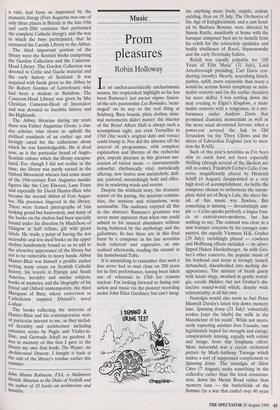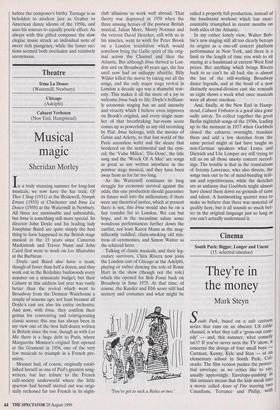Music
Prom pleasures
Robin Holloway
In an uncharacteristically uncharismatic season, the resplendent highlight so far has been Rameau's last ancien regime fusion- of-the-arts pantomime Les Boreades, 'semi- staged' on its way to the real thing. at Salzburg. Bare boards, plain clothes, mini- mal movements didn't matter: the interior of the Royal Albert Hall is always such a scrumptious sight, not even Versailles in 1760 (the work's original date and venue) could trump it. Nor did the absence till the interval of programmes, with complete explanation and libretto of the recherche plot, impede pleasure in this glorious suc- cession of varied music — instrumentally colourful, rhythmically vital, melodically alluring, now festive now melancholy, defi- ant, pastoral, astonishingly bold and effec- tive in rendering winds and storms.
Despite the withheld story, the dramatic nature of the pacing, the spacious continu- ities, the tensions and relaxations, were unmissable. The audience enjoyed all this in the abstract: Rameau's greatness was never more apparent than when one could submit to his musical abundance without being bothered by the mythology and the gallantries. In fact these are in this final burst by a composer in his late seventies both coherent and expressive, as one realised afterwards, reading the resume in the homebound Tube.
It is astonishing to remember that such a fine score had to wait close on 200 years for its first performance, having been taken out of rehearsal in 1760 for reasons unclear. I'm looking forward to fusing text action and music via the pioneer recording under John Eliot Gardiner; but can't imag- ine anything more lively, supple, ardent, yielding, than on 19 July. The Orchestra of the Age of Enlightenment, and a cast head- ed by Barbara Bonney, were directed by Simon Rattle, manifestly at home with the baroque composer best set to benefit from his relish for the colouristic opulence and bodily ebullience of Ravel, Szymanowsky and the early Stravinsky ballets.
Relish was equally palpable for '100 Years of Film Music' (31 July), Lord Attenborough presiding, Carl Davis con- ducting (mostly). Hearty, nourishing kitsch, pathos, uplift, more enjoyable than many a would-be serious Soviet symphony or mini- malist oratorio and (in the earlier decades) far more skilful. I was settling down the next evening to Elgar's Kingdom, a maxi- malist oratorio with a vengeance, in a per- formance under Andrew Davis that promised dramatic momentum as well as the more usual devotional fervour, when a power-cut severed the link to Old Jerusalem via the Three Choirs and the shires of Edwardian England (not to men- tion the RAH).
Such of this year's novelties as I've been able to catch have not been especially thrilling (though several of the likeliest are still to come). Friedrich Cerha's Cello Con- certo, magnificently played by Heinrich Schiff (6 August) disappointed at a very high level of accomplishment. As befits the composer chosen to orchestrate the incom- plete third act of Berg's Lulu, the sheer fin- ish of this music was flawless. But something is missing — devastatingly sim- ple — Cerha speaks perfectly a lingua fran- ca or central-euro-moderne, but has nothing to say. The contrast was clear in a new trumpet concerto by his younger com- patriot, the equally Viennese H.K. Gruber (29 July), ravishingly played — cowhom and Hoffnung effects included — by silver- lipped Haken Hardenberger. As with Gru- ber's other concerto, the popular music of his boyhood and teens is lovingly teased, debauched, disembodied into melting dis- appearance. The mixture of brash gaiety with latent elegy, swathed in gentle nostal- gia, recalls Mahler; but not Gruber's dis- tinctive sound-world which, despite wide referentiality, is all his own.
Nostalgia would also seem to fuel Peter Maxwell Davies's latest trip down memory lane. Spinning Jenny (21 July) 'colourfully evokes [says the blurb] the mills in the Manchester of his youth'. While not neces- sarily expecting another Iron Foundry, one legitimately hoped for strength and energy, conspicuously missing, equally with colour and image, from this lymphatic effort. More successful was a recent orchestral picture by Mark-Anthony Turnage which makes a sort of suppressed complement to Spinning Jenny. The nostalgia of Silent Cities (7 August) seeks something in the collective rather than the local conscious- ness, down the Menin Road rather than memory lane — the battlefields of the Somme (in a war that ended over 40 years before the composer's birth). Turnage is as beholden to modern jazz as Gruber to American dance idioms of the 1950s, and uses his sources to equally poetic effect. As always with this gifted composer the slow elegiac music struck an individual note of sweet rich plangency, while the faster sec- tions seemed both overladen and relatively anonymous.



























































 Previous page
Previous page